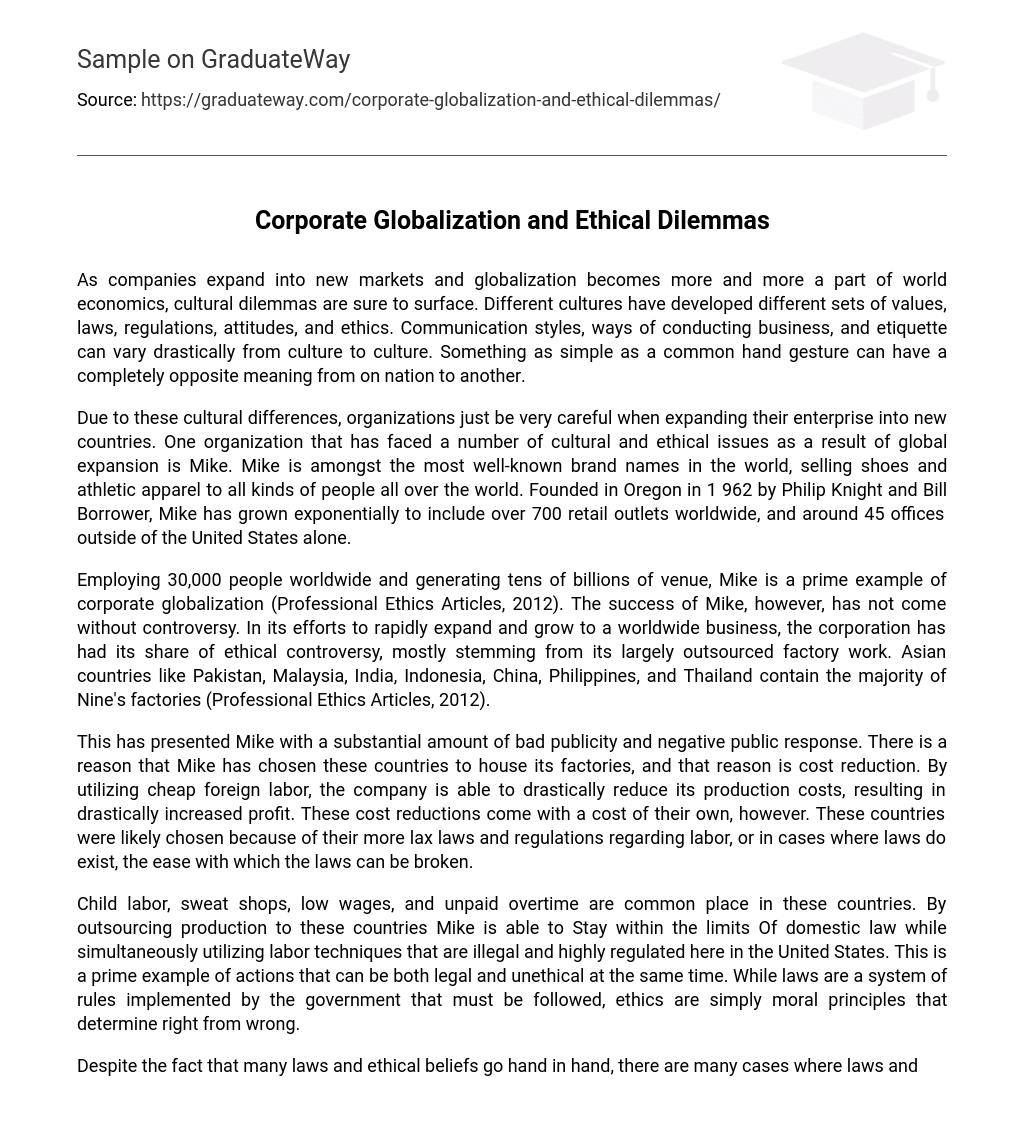As companies expand into new markets due to globalization, cultural challenges are inevitable. Different cultures have unique values, laws, regulations, attitudes, and ethics. Communication styles, business practices, and etiquette differ greatly across cultures. Even a seemingly harmless hand gesture can have completely different interpretations in various countries.
Due to cultural differences, organizations must be cautious when expanding their enterprise into new countries. Mike, a globally renowned brand selling shoes and athletic apparel, has faced various cultural and ethical issues as a result of its global expansion. Founded in 1962 by Philip Knight and Bill Borrower in Oregon, Mike has experienced tremendous growth, with over 700 retail outlets globally and approximately 45 offices outside the United States.
Mike represents corporate globalization with its 30,000 employees around the world and impressive revenue in the tens of billions (Professional Ethics Articles, 2012). Nevertheless, Mike’s journey to success has been marred by ethical disputes arising from its extensive use of outsourced factory labor as it aimed for rapid expansion and global reach. Most of Nine’s factories are located in Asian countries such as Pakistan, Malaysia, India, Indonesia, China, Philippines, and Thailand (Professional Ethics Articles, 2012).
The substantial amount of negative public response and bad publicity Mike has received is due to its choice of countries for housing factories. Cost reduction is the main reason behind this decision. By employing cheap foreign labor, the company can significantly lower production costs, leading to increased profit. Nonetheless, these cost reductions come at a price. These countries were likely selected because they have more lenient labor laws and regulations. In cases where laws do exist, they are easily broken.
These nations have a significant presence of child labor, sweat shops, low wages, and unpaid overtime. Mike chooses to outsource production to these countries, which allows him to follow domestic law while taking advantage of labor practices that are forbidden and closely monitored in the United States. This situation serves as a prime example of practices that can be legal but unethical at the same time. Government-established laws act as regulations that must be followed, whereas ethics are moral principles that determine what is considered right or wrong.
While laws and ethical beliefs typically coincide, there are situations where they differ. One such instance is sweatshops, which are regarded as morally wrong by the majority of individuals, although they may be legally authorized in certain nations. Sweatshops have gained notoriety due to their inadequate working conditions involving unsatisfactory sanitation and safety protocols, unjust pay, excessive hours of labor, and lack of employee benefits. Furthermore, they are linked with different types of abuse including verbal, physical, and sexual mistreatment.
According to Documenting. Org (2013), sweatshops predominantly employ women who are subjected to enforced birth control and pregnancy tests to ensure their continued work without needing extra time off or benefits. These unethical practices generate significant controversy for corporations that employ sweatshop labor. The involvement of child labor further exacerbates the already appalling nature of sweatshops, adding to the controversy surrounding international business.
Child labor deprives children of essential social and educational support needed for their development, as they are unable to attend school. This connection between child labor and higher illiteracy rates, poverty, insufficient social growth, and other issues is significant. Moreover, it also contributes to economic and overpopulation challenges since impoverished families mistakenly believe that having more children will increase their income.
Unfortunately, child labor not only negatively impacts the family income but also results in a lack of education and valuable job experience as the children grow up. This further contributes to economic and social distress within the community. The consequences go beyond these issues and include a deprived childhood, mental health problems, physical harm from unsafe working conditions, and child abuse (source: https://spotlights.com/crime/top-lo-reasons-why-child-labor-is-bad, 2013).
Child labor has several negative effects, one being the unfortunate consequence of turning children into criminals. The extensive hours of demanding work, mistreatment, and lack of compensation frequently drive children to engage in theft and other minor offenses. This behavior tends to escalate as they mature, ultimately leading many former child labor victims to become hardened criminals in adulthood (source: https://spotlights.com/crime/top-10-reasons-why-child-labor-is-bad/, 2013).
Initially, Nine’s lack of ethical position had a beneficial effect on the company. They managed to produce goods inexpensively and sell them at high prices, resulting in substantial profits. This resulted in an exceptional profit margin as products costing less than one dollar were sold for more than a hundred dollars. Regrettably, Mike encountered the unfortunate outcome of public awareness growing about the unethical practices connected to their purchases.
Due to these unethical practices, Mike has received significant negative publicity, leading to a boycott by numerous consumers who no longer wish to support the company. In 1998, Phillip Knight, the CEO and founder of Nine, acknowledged the concerns and pledged to make changes during a press conference held in Washington DC. However, there is still skepticism regarding whether these promises have been fulfilled, resulting in ongoing scrutiny of Mike (Connors, 2001). It is crucial for a company to maintain cultural sensitivity in both its expansion into foreign markets and its domestic market.
Although sweat shops and child labor may be tolerated in certain cultures, it is not deemed acceptable universally. For instance, Mike’s reliance on a production method that is culturally sanctioned in other nations has faced disapproval domestically and within various international societies. Consequently, this company’s reputation will permanently bear a negative stain.





